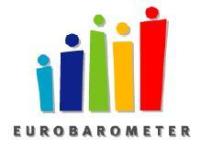Balkan EU member states are the most dissatisfied
euinside, February 5, 2010
 Bulgarians are the most dissatisfied citizens of the EU, according to a Eurobarometer survey. They are followed by the Greeks and the Romanians. The most satisfied with their lives are the Danes, followed by the Nordic peoples - the Swedes, the Dutch and the Finish. Despite feeling positive about their lives in general, Europeans are on average quite dissatisfied with the way their public administrations are run. In every country apart from Luxembourg and Estonia, Europeans feel this has worsened over the last five years and they expect it to continue to get worse in all countries except in Luxembourg.
Bulgarians are the most dissatisfied citizens of the EU, according to a Eurobarometer survey. They are followed by the Greeks and the Romanians. The most satisfied with their lives are the Danes, followed by the Nordic peoples - the Swedes, the Dutch and the Finish. Despite feeling positive about their lives in general, Europeans are on average quite dissatisfied with the way their public administrations are run. In every country apart from Luxembourg and Estonia, Europeans feel this has worsened over the last five years and they expect it to continue to get worse in all countries except in Luxembourg.
Eurobarometer has also surveyed the European public opinion about the quality of healthcare in the 27 Eu member states. In general, Europeans rated the provision of healthcare much more positively. Respondents in Belgium, the Netherlands and Luxembourg had particularly high scores while those living in Bulgaria, Greece and Romania were most dissatisfied. Most Europeans felt that healthcare provision had worsened over the last five years, and that it was likely to worsen further.
However, Europeans were particularly dissatisfied with the way inequalities and poverty are addressed in their country. Only Luxembourg and the Netherlands registered a positive score, while respondents in Latvia and Hungary were the most strongly dissatisfied. In all countries except Malta, Europeans feel that policies in this area have got worse.
With regard to homes, the results also vary significantly from country to country. According to Eurobarometer, in all countries, most people own their own homes. This is especially so in central and eastern European countries, where – with the transition from socialist to a market economy – most people acquired possession of the housing they occupied. The proportion owning their own homes, therefore, is as high as 85–90% in the three Baltic States, Hungary and Slovakia and around three-quarters. A majority of those owning their own home do not have mortgages.
In the same time the variations with regard to what share of their incomes households in Europe spend to service their homes, are also very big. For example, people in central and eastern Europe spend around 90% of their income to cover their household bills. The Europeans in the more developed Eu member states spend one fifth of their incomes for bills, one third of which goes for mortgage, the rest for bills, repairs, fuel.
Bulgaria is with the lowest scores on one more indicator - affordability of housing. Many of the respondents in Lithuania, Romania, Spain, Hungary, Poland and Malta are dissatisfied with the prices of housing in their countries while in Sweden and Estonia people say they can afford buying a housing. They are followed closely by Denmark, Latvia and Germany.